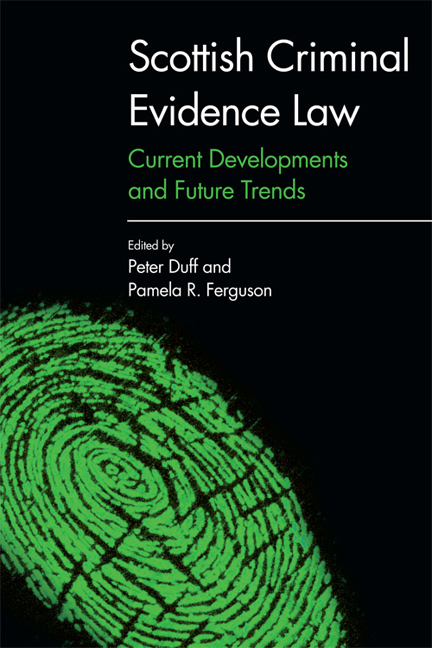Book contents
- Frontmatter
- Contents
- The Contributors
- Acknowledgements
- Table of Cases
- Table of Legislation
- Introduction
- 1 Cadder and Beyond: Suspects’ Rights and the Public Interest
- 2 ‘Access to Justice’ for Complainers? The Pitfalls of the Scottish Government’s Case to Abolish Corroboration
- 3 The Relevance of Sexual History and Vulnerability in the Prosecution of Sexual Offences
- 4 ‘Similar Fact’ Evidence and Moorov: Time For Rationalisation?
- 5 Hearsay in Scots law: Rethinking and Reforming
- 6 Eyewitness Identification Evidence and its Problems: Recommendations for Change
- 7 Assessing Witness Credibility and reliability: Engaging Experts and Disengaging Gage?
- 8 The process of Criminal Evidence Law Reform in Scotland: what Can We Learn?
- 9 Scottish Criminal Evidence Law Adrift?
- Bibliography
- Index
3 - The Relevance of Sexual History and Vulnerability in the Prosecution of Sexual Offences
Published online by Cambridge University Press: 24 April 2021
- Frontmatter
- Contents
- The Contributors
- Acknowledgements
- Table of Cases
- Table of Legislation
- Introduction
- 1 Cadder and Beyond: Suspects’ Rights and the Public Interest
- 2 ‘Access to Justice’ for Complainers? The Pitfalls of the Scottish Government’s Case to Abolish Corroboration
- 3 The Relevance of Sexual History and Vulnerability in the Prosecution of Sexual Offences
- 4 ‘Similar Fact’ Evidence and Moorov: Time For Rationalisation?
- 5 Hearsay in Scots law: Rethinking and Reforming
- 6 Eyewitness Identification Evidence and its Problems: Recommendations for Change
- 7 Assessing Witness Credibility and reliability: Engaging Experts and Disengaging Gage?
- 8 The process of Criminal Evidence Law Reform in Scotland: what Can We Learn?
- 9 Scottish Criminal Evidence Law Adrift?
- Bibliography
- Index
Summary
INTRODUCTION
The investigation and prosecution of sexual offences remains one of the most fraught and problematic aspects of criminal justice. Even with the introduction of various protective measures for vulnerable witnesses and complainers, deep and justifiable concerns persist about the level of reporting to the police, the extent of attrition, and the conviction rates. The treatment (actual and perceived) of complainers in the courtroom has a significant influence on these matters.
Sexual offence trials frequently involve the leading of sexual history evidence and the cross-examination of complainers about their previous sexual experience, behaviour and partners. This is despite the introduction of so-called ‘rape shield’ provisions, which purport to restrict the use of sexual history evidence and to curb judicial discretion as regards its admission. Such provisions have been enacted in various common law jurisdictions including England and Wales, Canada and Scotland, in an effort to improve the courtroom experience for complainers and thus encourage greater reporting of sexual violence. The rationale for these measures is to address the pervasive culture of disbelief regarding complainers and to offset the secondary victimisation or re-traumatisation that occurs through, and as a consequence of, the trial process. Rape shield legislation aims to protect the complainer's right to privacy and dignity, as well as to increase accuracy in fact-finding.
Although ‘rape shield’ protections have been embedded within criminal justice systems for some time, it has been suggested by commentators in various jurisdictions that these legislative efforts remain susceptible to being sidestepped either through defence trial strategies or through ‘judicial override’, such that the law in action is less protective and useful than was hoped. As we shall see below, this observation is borne out in Scotland. This chapter examines the ways in which laws designed to protect sexual assault complainers in Scotland fail in practice. We will argue that focusing on the ‘rape shield’ provisions, as well as the measures designed to protect vulnerable witnesses, as ‘solutions’ to the problems faced by sexual assault complainers in an adversarial system allows us to ignore more systemic questions about how those complainers become vulnerable within the criminal justice system, as well as how the criminal justice system understands and perpetuates a certain view of what it means to be vulnerable.
- Type
- Chapter
- Information
- Scottish Criminal Evidence LawCurrent Developments and Future Trends, pp. 67 - 96Publisher: Edinburgh University PressPrint publication year: 2017



